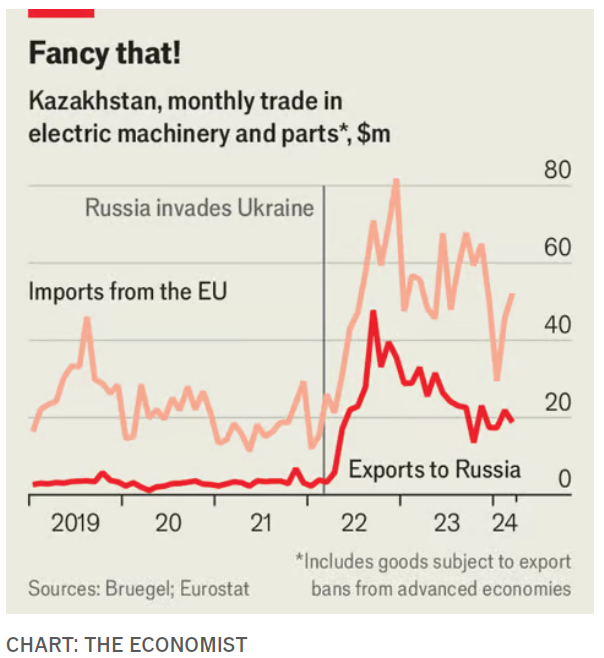Why Sanctions Often Fail To Work
Back in early 2022, there was a great deal of optimism that sanctions against Russia would cripple its economy. Those predictions have not come true. A recent article in The Economist shows why:

Prior to 2022, Kazakhstan sold relatively little electrical machinery to Russia.After the Ukraine invasion, Kazakh exports soared more than 7-fold.How was Kazakhstan able to boost output so rapidly?Notice that at the same time this occurred, Kazakh imports of electrical machinery from the EU also increased sharply.It’s pretty clear that Russia was using this former Soviet republic as a way of evading sanctions.
For Europe’s policymakers, this is all bad news. “We expected some leakage,” says one official, “but not on the scale we now know about.” In December, the eu’s 12th round of restrictions targeted firms in Armenia and Uzbekistan for the first time. Bureaucrats have since threatened more sanctions on third countries and Europeans exporting to them, but have taken action only against a few firms. For each firm added to the blacklist, another is registered elsewhere.
The same problem occurs when countries try to diversify their supply chains.The US put high tariffs on Chinese imports in order to reduce our dependence on that economy.As a result, US imports from neighboring countries like Vietnam increased sharply.Not surprisingly, Vietnamese imports from China increased at the same time.We are still buying lots of stuff from China, but in a more more roundabout way with higher transportation costs.
None of this means that sanctions are necessarily a bad idea.It’s plausible that sanctions on Russia have at least slightly reduced its ability to wage war.Rather the point is that we should not expect sanctions to be leakproof.
PS.After writing this post, I noticed another example:

Interestingly, the American media blames China but not Germany for aiding Russia’s war machine.
More By This Author:
Cochrane On Interest Rates And Exchange RatesMonetary Policy Was Even Worse Than We Thought
When Policy Goals Conflict



